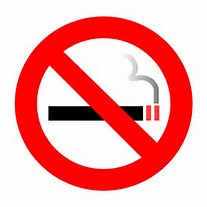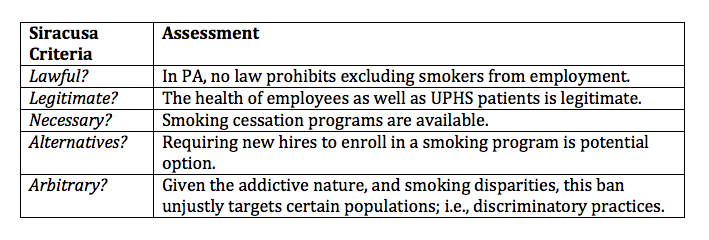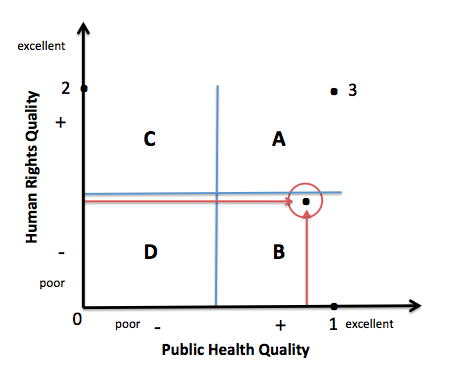Examining the Human Rights Impact of a Hiring Smokers Ban
In light of a decision by the University of Pennsylvania Health System to no longer hire individuals who self-identify as smokers, as well as established hiring bans at other institutions, I decided to examine the potential impact from a human rights perspective as well as an ethical framework approach.

BACKGROUND
As of July 1, 2013, the University of Pennsylvania Heath System (UPHS) joined several other large academic medical centers in banning the new hire of self-reported smokers. Despite the long-standing evidence of smoking's ill effects -- first suggested by Drs. Doll and Hill in the early 1950s -- banning the hiring of smokers is a relatively recent phenomenon. The Cleveland Clinic first enacted its policy in September of 2007, and several other institutions have since followed suit. More widely implemented, and perhaps accepted, is the general ban on smoking in the workplace.
Since the Cleveland Clinic ban, and more recently with the UPHS ban, the ethics of such a ban have been debated both in popular press (The Daily Pennsylvania; Philly.com) and peer-reviewed journals (NEJM article #1; NEJM article #2; AJPH article). Undoubtedly there are others. In addition to the ethical principles in question, a basic human right may also be violated through this restriction: discrimination. In this post, I examine the clash of values through a human rights lens and question the limits of an employer controlling the behavior of its employees.
CLASH OF VALUES
The fundamental issue is a clash of competing values. As framed through an ethics lens (the humans rights perspective will follow), the competing ethical concerns can readily be depicted on a graph in this Figure, adapted from Field and Caplan.

As the hiring policy is weighed against the core ethical principles, autonomy is differentially affected depending on which principle is given the most weight. A utilitarian perspective limits autonomy of the individual the most at the benefit of the workforce, whereas a nondiscriminatory preference respects autonomy the most. By extension, nondiscrimination is also a human right and therefore a human rights approach can be used to examine the policy.
LEGALITY
Despite receiving public funds, UPHS is not a government entity, and as smokers are not considered a protected class of people, constitutional law is not applicable (probably should have this statement confirmed by a consitutional lawyer…if any are reading this and care to chime in). Additionally, no law exists in Pennsylvania to the contrary of UPHS's policy (although in New Jersey a law does exist, and therefore UPHS can not effect this same policy for New Jersey locations). So while the legality of the policy is currently accepted, there are several implications from this policy: the nature of smoking and precedence for other bans.
ADDICTIVE NATURE
The addictive nature of smoking cannot be understated. It is frequently not simply a matter of saying one will give up smoking in order to seek employment. This lack of voluntary basis, and the fact that tobacco use is associated with racial/ethnic and socioeconomic disparities indicates the policy unjustly targets specific groups: those that are unable to voluntarily quit and traditionally underserved populations.
SLIPPERY SLOPE
The potential for this policy to serve as precedence for additional bans deserves mention. For example, with New York having attempted a ban on the sale of large sodas, and many states enacting cell phone driving restrictions, it is conceivable that an employer could follow suit. An employer may prevent the hire of new employees who text while drive or consume large quantity of sugary drinks. From an employee's perspective, what one does in his or her private life should not affect employment.
POTENTIAL HYPOCRISY
The UPHS policy extends throughout the health system with the intention of "improv[ing] the overall health of our workforce while reducing health care benefit cost". However, employees of the University of Pennsylvania are not subject to the hiring policy. It is possible for faculty employed through the University to also have appointments within the health system. Why should one group be exempted from this policy, if as UPHS states the overall goal is improving the health of all employees?
HUMAN RIGHTS
The tension between public health and private life is well established. UN General Comment No. 14, "The right to the highest attainable standard of health. Committee on Economic, Social, and Cultural Rights," a widely adopted and often quoted comment notes "issues of public health are sometimes used by States as grounds for limiting the exercise of other fundamental rights" (7). Despite its government level intention, it is still useful to private entities when faced with the question: When it is appropriate to limit ones individual rights and freedoms (in this case, nondiscrimination) in the name of the public or common good? Fortunately, there are several instruments that can guide the answer to this question.
APPLICATION OF INSTRUMENTS
The Siracusa Principles guide officials when considering limiting or derogating a human right. Essentially, there are five criteria to consider: lawful, legitimate, necessary, alternatives, arbitrary. The table below applies these criteria to the UPHS smoking ban.

A Human Rights Impact Assessment is another instrument that can guide policymakers. Built upon the well-used environmental impact assessments, this methodology was extended to human rights areas. While a full assessment is outside the scope of this post, when using the tool it will be apparent that there exists the potential for discrimination in the at-risk populations. The hiring ban can also be depicted visually using a 2x2 table adapted from Mann et al.

The UPHS policy has a sector score of 'B' - need to improve human rights quality - and a points score of '1' - ideal public health quality. With the goal of achieving a score in the upper right quadrant ('A','3'), this initiative falls short in protecting against discrimination. Despite being a somewhat subjective instrument, it is nevertheless valuable for demonstrating the tension inherent in such a ban.
RESOLVING THE CONFLICT
From a human rights perspective the ban does not protect the interest of individual, and results in a discriminatory policy.
Cite: Goldstein ND. Examining the Human Rights Impact of a Hiring Smokers Ban. Jan 8, 2015. DOI: 10.17918/goldsteinepi.
